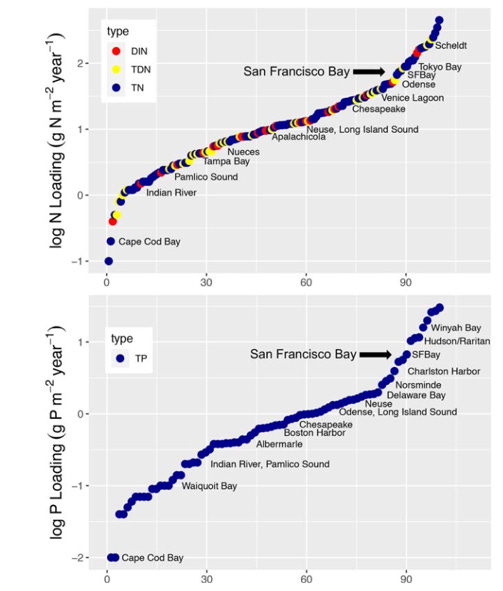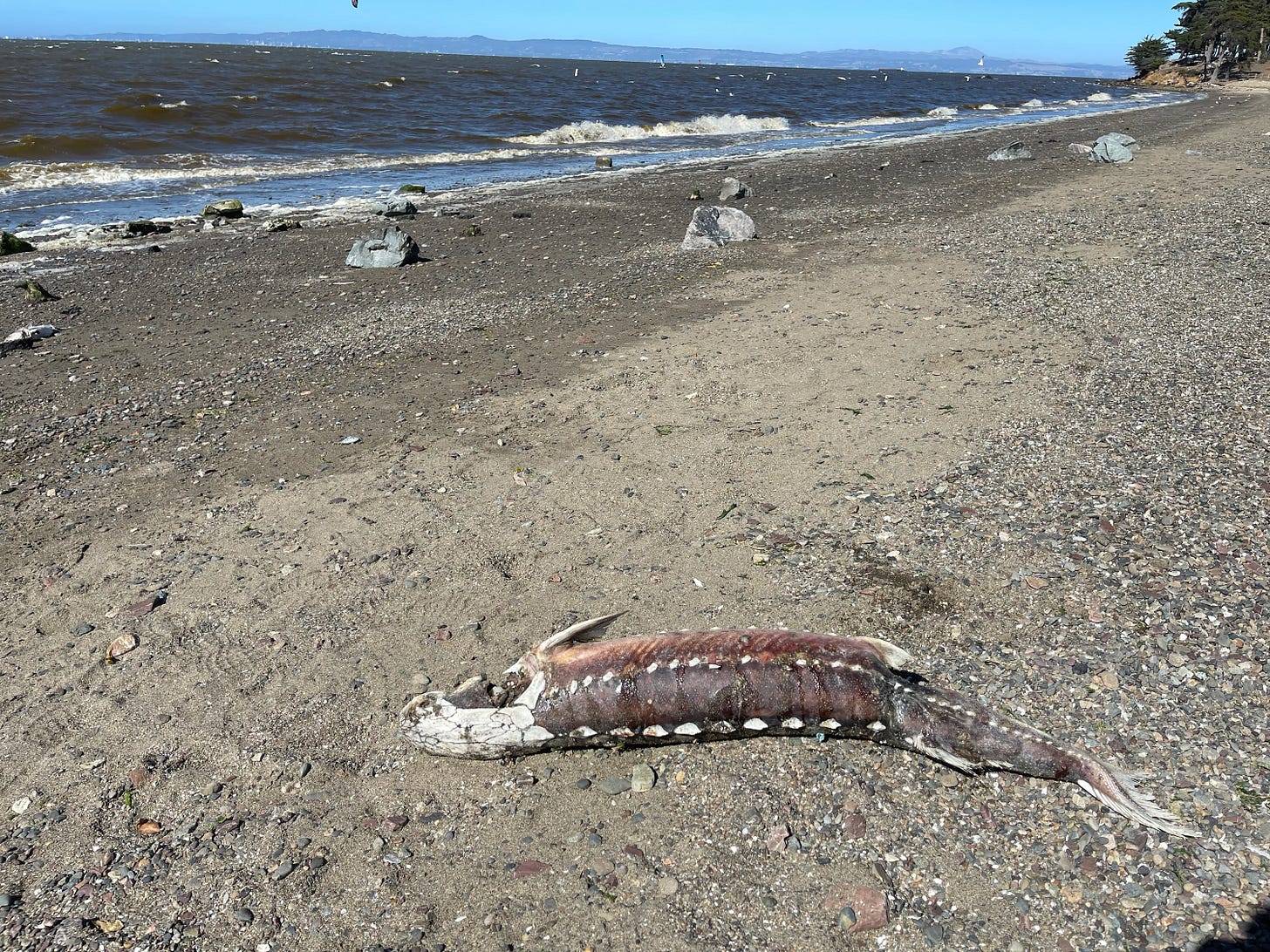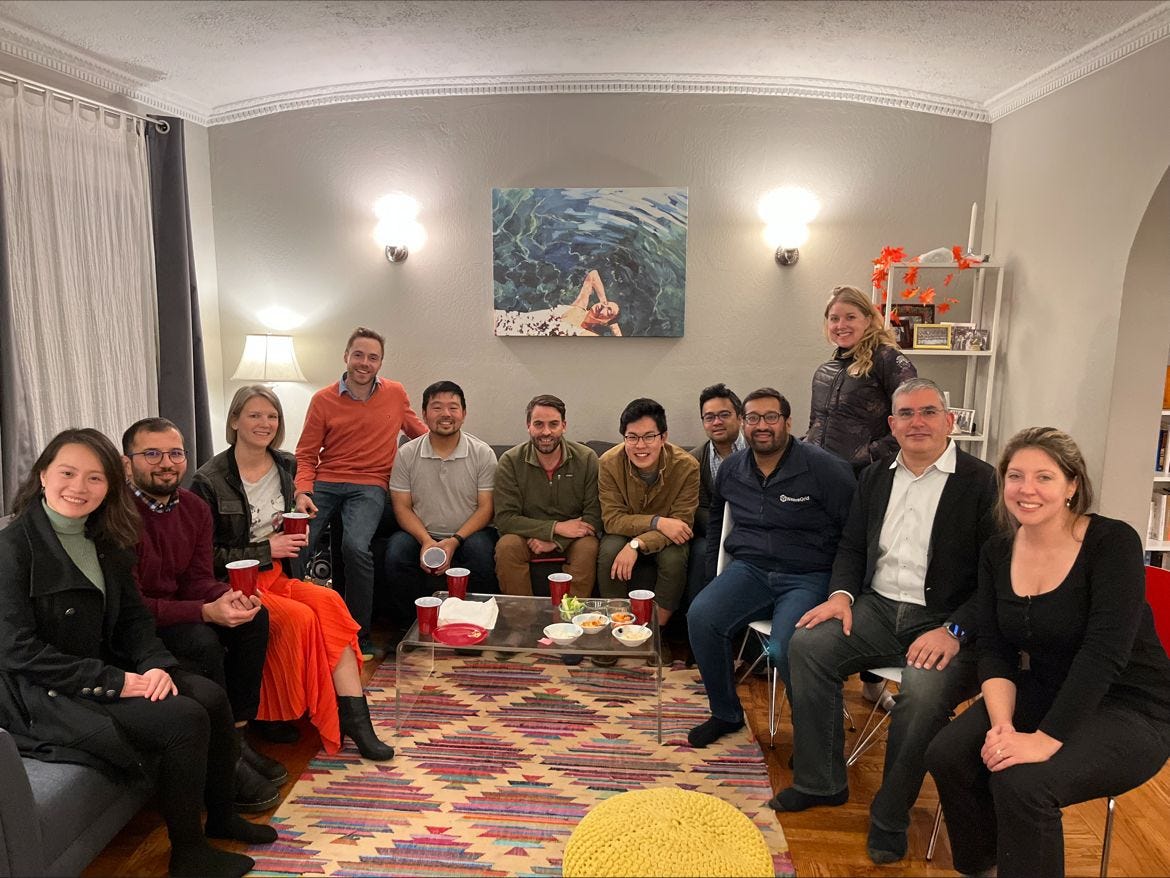Greenhouse Gaslighting and California’s Water Crisis
by Jon Rosenfield, Ph.D. Senior Scientist at San Francisco Baykeeper
On Sunday August 28th, my phone blew up with reports of dead fish lining the shores of San Francisco Bay. San Francisco Baykeeper had been tracking a harmful “red tide” algae bloom since late-July. Given what we understood of the specific algae causing this bloom and the vast expanse of San Francisco Bay it now covered, we knew a substantial fish kill was possible. But nothing could have prepared us for the sight of hundreds of sturgeon and striped bass washing up on beaches, or schools of smaller fishes gasping for air. San Francisco Bay has not experienced such a prolonged or widespread algal bloom or a fish kill this devastating in recorded history.
Following the proliferation of algae and dying fish, Baykeeper staff spoke with journalists from California, around the country, and the world. Each reporter asked whether climate change caused the algae bloom. Representatives of regional and national regulatory agencies fed this narrative, speculating that the dead fish and reddish water were direct evidence of rising global temperatures. Although we’re still studying what specifically triggered this bloom, the data reveal no obvious connection to rising global temperatures or any of its side effects.
The instinct to link natural disasters to climate change is understandable. Rising air temperature will increase water temperatures and dramatically alter global patterns of precipitation and evaporation. But political leaders, captains of industry, and regulatory agencies increasingly invoke climate change as a way of dodging responsibility for disasters that they could prevent. I call this “greenhouse gaslighting.”
The truth about this summer’s red tide and fish kill is that San Francisco Bay is among the most enriched for nitrogen and phosphorus compounds (“nutrients”) of any estuary in the world (Figure 1). These nutrients – which are food for algae – come primarily from treated wastewater effluent from dozens of sewage treatment plants that surround the Bay. Researchers have long predicted that nutrient enrichment would fuel a large harmful algae bloom because parts of the Bay Area are generally warm and sunny enough to support such blooms during the summer. So, while climate change will likely make harmful algal blooms more frequent, conditions necessary to support them exist already, even without climate change.

Greenhouse gaslighting diverts our attention away from potential solutions, just as climate change denialism has for too many years. For example, water recycling can simultaneously limit the wastewater-borne nutrients that fuel harmful algal blooms and reduce urban demand for water from California’s over-tapped rivers. Baykeeper is asking municipalities to invest in creative, multi-benefit solutions such as recycling, but they won’t if their ratepayers are convinced that harmful algal blooms are inevitable in a warming climate.
California’s response to drought is a prime example of politicians leveraging legitimate climate concerns to support outdated approaches to water management. Although high temperatures and aridity have exacerbated the current drought and are expected to increase the frequency and intensity of future droughts, California’s long-standing water scarcity problems are rooted in the state’s unsustainable demand for an unpredictable supply. Annual precipitation totals in San Francisco Bay’s Central Valley watershed are extremely variable, but they show no long-term trend so far (see also, here). On the other hand, water diversions have increased significantly over the past several decades, leaving far less fresh water to flow into the Bay. In a typical year, more than half of the water that would otherwise flow into the Bay is diverted or stored in reservoirs upstream. The results of California’s over-reliance on unpredictable precipitation include San Francisco Bay’s six endangered fish species, declining fisheries and water quality, and chronic subsidence of land into over-tapped aquifers.
Despite the evidence that California’s water management practices have been unsustainable for decades, Governor Newsom’s Water Supply Strategy singles out climate change as the cause of water scarcity. His plan calls for more dams and new diversions and all but ignores that California’s agriculture industry takes 80% of the water used by Californians. During the 2012-2016 drought, agribusiness increased the acreage of crops like nut trees that require a steady water supply. Newsom’s signature water supply effort is the unsuccessful pursuit of voluntary deals with the very water districts responsible for profligate diversions. Meanwhile, his administration has blocked new protections for San Francisco Bay’s fish, wildlife, water quality, and communities.
Solutions for California’s perpetual water scarcity must include reducing demand, especially in the warmer, drier world we are headed towards. Watering vast cattle herds, nut orchards, and rice paddies in a semi-desert makes little sense. Unfortunately, the Newsom administration seeks to maintain or increase water deliveries for these unsustainable endeavors.
Curbing climate change is essential – there is no greater threat to our civilization. But keeping global temperatures in check is not a panacea for problems with root causes that are not climate-related. Solutions for California’s multiple water crises are available if we act quickly. Rather than being distracted by cynical greenhouse gaslighting, California must transform water management practices and policies inherited from 19th and 20th century, and invest in taming its unsustainable demand for water.
✍️ The Draw-down
Stepping Forward is inspired by carbon drawdown-focused non-profit DrawDAO. The artwork represents the stepping stones into a new era of climate change through natural carbon removal. Created by DrawDAO artist Silvana P. Duncan. To see more art and help fund critical carbon removal research, visit DrawDAO.org
🎙My Climate Journey Podcast
💡 Jason talked to Ira Pearl, Vice President of Environmental Sustainability at Cox Enterprises, about the company’s approach to sustainability, some of the progress its made in reaching net zero goals, as well as the barriers they've come across.
🚛 Cody talked to Matt LeDucq, CEO and co-founder of Forum Mobility, about electrifying drayage trucks, the history of clean air regulations, environmental justice issues that regulations are aiming to address, and loads more.
✨ Highlights
👩💻 Climate Jobs
For more open positions, check out the #j-climatejobs channel in MCJ Slack as well as our job board featuring MCJ portfolio companies.
Education and Community Manager at Activate (Berkeley, CA/Boston, MA/New York City, NY)
Product Manager at Sustainable Bitcoin Protocol (Remote)
Deployment Manager at Carbon Lockdown (Washington, DC/Baltimore area)
Head of Climate Product Strategy at Dovetail (London)
Vice President, Engineering at Rheaply (Remote)
UX/UI Designer at Runwise (Remote)
Business Operations Lead at SALT (Remote/Europe)
Product Designer at Sense (Cambridge, MA)
Director of Sales Oil and Gas and Personal Care at Solugen (Houston, TX)
Materials Science Research Associate at Tender Foods (Somerville, MA)
Partner Account Executive, Automotive & Charging at Weavegrid (San Francisco Bay Area)
🗓 November + December Events
Be sure to click the event title for details & RSVP info. For more climate events, check out the #c-events channel in MCJ Slack.
☀️ MCJ Los Angeles Meetup: Grab a coffee or cocktail. Make some new friends and nerd out on your favorite topics- renewables, regenerative ag, CCUS, IRA, heat pumps… (12/10)
🇨🇦 MCJ Toronto: Climate Tech Social: Gathering folks already working in climate tech, or curious about transitioning. Non-members welcome! (12/08)
💭 Product Manager Climate Action Brainstorm: Support PMs in creating climate action through the products they currently manage, from ideation through execution. (12/12)
🤝 MCJ Career Transitions Meetup: Networking mixer! Attendees will have the opportunity to join breakout rooms based on function or sector, and connect with others looking for similar roles or people working in that space. Details here. (12/14)
👩💻 MCJ Early Career Meetup December: Participants will have conversations in small break-out rooms and hear from Lola Fernandez, who launched a climate-focused branch of her venture capital firm, VentureSouq. (12/14)
👋 MCJ Community Welcome Call: Connect, share and learn with MCJ team and community members. (12/15)
MCJ Climate Voices is a free weekly email curating news, jobs, My Climate Journey podcast episodes, and other noteworthy happenings in the MCJ member community.
💭 If you have feedback or items you’d like to include, feel free to reach out.
🤝 If you’d like to become an MCJ community member, apply today.





